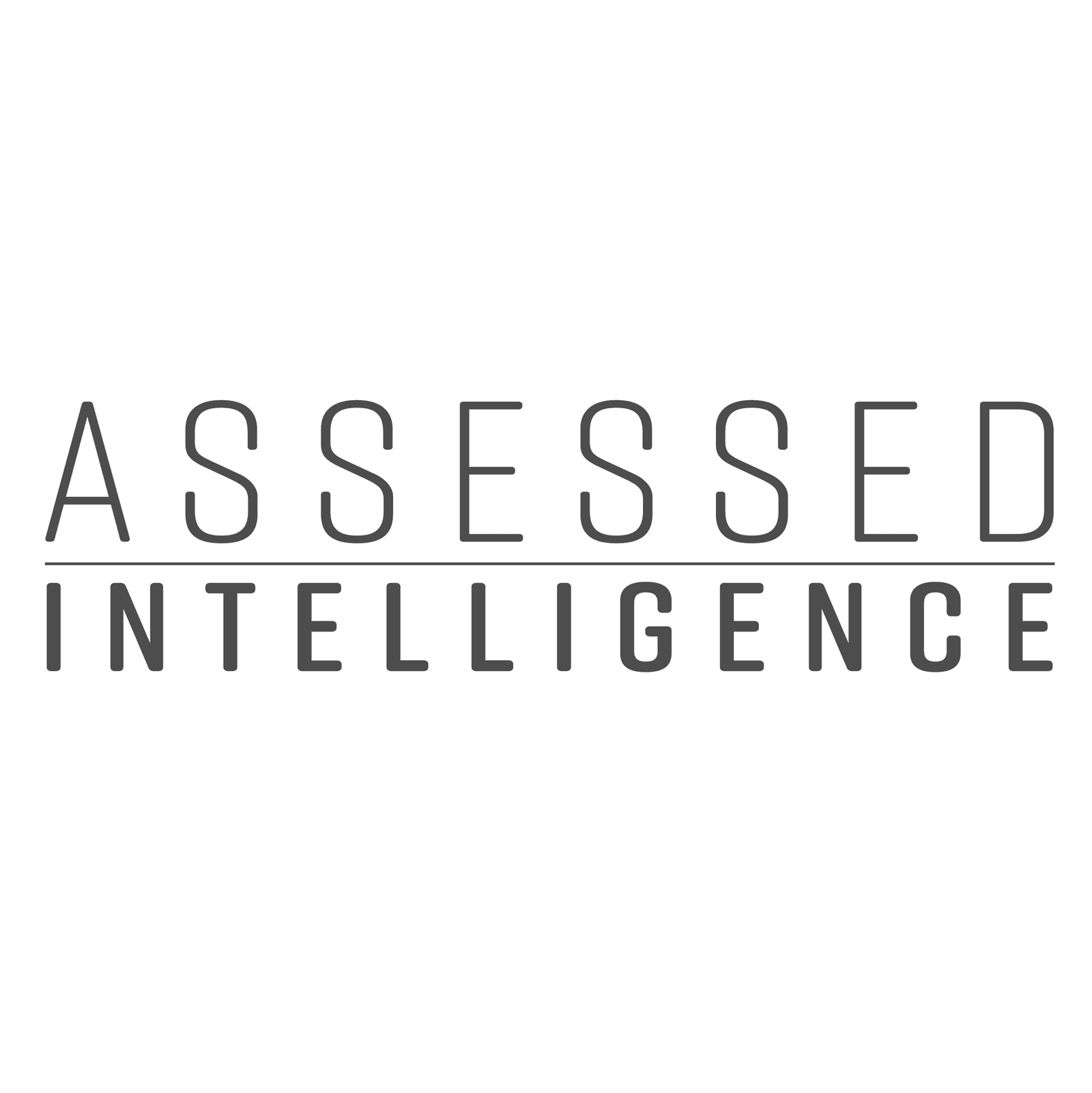Leading Secure Innovations
ADVISORY & CONSULTATION
Advisory and consulting engagements with Assessed Intelligence are structured as focused, project-based or short-term partnerships designed to address specific goals or challenges. Whether you need expert input on a strategic decision, guidance on regulatory alignment, or support developing a governance framework, these models offer targeted, high-impact support. We combine deep expertise with tailored delivery to help you navigate risk confidently with practical solutions aligned to your business and regulatory goals.
Check Out These Numbers
Our diverse team has Extensive Experience Across, Cybersecurity, AI, Ethics, Law and Privacy
Expertise exactly where it matters
AI Readiness & Ethical AI Assessments
Strategic advisory services, maturity assessments, and program design anchored in leading cybersecurity and AI frameworks, focused on practical, results-driven outcomes.
Cybersecurity or AI Program Maturity
Baseline your Responsible AI or Cybersecurity programs and find a true north star on how to improve your organization.
Risk & Governance Advisory
Integrated frameworks for enterprise-wide governance across cybersecurity and AI, grounded in real-world technical application.
Audit Preperation
prepare for audits for explainability, bias, and compliance with emerging mandates (e.g., NYC Bias Audit, ISO/IEC 42001, EU AI Act, GDPR). Technical risk assessments against standards like NIST CSF, CMMC, and ISO/IEC 27001, with actionable recommendations for securing your environment.
Specialized Training & Education
Expert-led programs covering AI controls, secure development, threat detection, and audit preparedness, tailored to your operational context.
Our Process
Step 1
We begin by understanding your unique needs. Our initial consultation gathers essential information to tailor our solutions perfectly for you.
Step 2
Next, we conduct a thorough assessment of your existing systems. This allows us to identify vulnerabilities and areas for improvement.
Step 3
We then design an actionable strategy with clear steps. Our focus is to ensure that your security and compliance needs are met efficiently.
Step 4
Finally, we implement the agreed-upon solutions. Our team stays engaged throughout to ensure everything is running smoothly and effectively.
Our Advisory Team

Chris brings a unique mix of insights, lived experiences, and competencies from over three decades of...Read More
Chris Leong
vCRAIO Advisor

Notoane R. Russell is a visionary IT leader with over 20 years of experience orchestrating global tec...Read More
Notoane Russell
vCISO

KC is a seasoned cybersecurity leader with over 15 years of experience designing and scaling security...Read More
KC O’Carroll
Cybersecurity Advisor

Kunal is a cybersecurity executive with 14+ years of experience leading security, privacy, and risk p...Read More
Kunal Sharma
vCISO Advisor

John is an experienced data governance and risk management expert, with over 20 years experience acro...Read More
John Smutniak
AI Auditor & Advisor

Nandita is an AI and data governance advisor with over a decade of experience helping public sector l...Read More
Nandita Rahman
Expert AI Advisory

Chris Leong
vCRAIO Advisor
Chris brings a unique mix of insights, lived experiences, and competencies from over three
decades of delivering technology-enabled solutions in the financial services,
government, enterprise software & SaaS, market data, and consulting industries
globally. He has led transformation and change initiatives leveraging technology to
deliver operational efficiencies from process automation, improved decision making
through insights harnessed from data, and embedding operational best practices
around governance, risk management, compliance, and assurance.
As a ForHumanity Fellow in Financial Services and Technology, a ForHumanity Certified
Auditor on GDPR and a Certified Algorithmic Ethics – Ethics Committee Expert. He
has a deep passion to help organizations advance their business transformation
programs that leverage technology, and enriching those initiates while ensuring ethics and risk management us embedded.
Chris is dedicated to finding new pathways for a sustainable digital future, while
complying with the relevant digital regulations such as GDPR, EU AI Act, EU Digital
Services Act, etc. He understands the importance of accountability,
governance, transparency, explainability, integrated risk management, compliance,
privacy, ethics, security, resilience, and the crucial role of audit in an interconnected
world fueled by data, and powered by AI.
- Group:Advisory
- Location:EMEA
- Focus Areas:Audit, Executive Leadership, Responsible AI
- Prof. AffiliationForHumanity

Notoane Russell
vCISO
Notoane R. Russell is a visionary IT leader with over 20 years of experience orchestrating global technology transformations for financial services and Department of Defense organizations. With expertise in building architecture practices, managing multimillion-dollar portfolios, and integrating emerging technologies, Notoane has consistently driven growth, mitigated risk, and advanced innovative cybersecurity business and organizational goals. He has partnered with executive leaders to translate strategy into actionable roadmaps, cultivate inclusive and high-performing teams, and align leadership approaches with values that reflect a commitment to innovation. Notoane’s career includes roles in financial services and senior IT leadership levels within the DoD. He has led and mentored global teams, negotiated multi-year contracts, and established firm-wide architecture standards. He holds a Master of Science in Cybersecurity and numerous certifications, including CISSP and CISM.
- Group:Advisory, Research
- Focus Areas:Business Development, Cybersecurity, Executive Leadership, Intelligence
- Prof. AffiliationISACA, ISC2
- TAGVeteran

KC O’Carroll
Cybersecurity Advisor
KC is a seasoned cybersecurity leader with over 15 years of experience designing and scaling security programs that align with business goals and regulatory requirements. He has led initiatives across both public and private sectors, including early-stage startups and mid-sized enterprises, with a focus on building sustainable, long-term security functions. A former member of the intelligence community, KC applies a threat-informed mindset to modern defense strategies.
- Group:Advisory
- Location:Eastern US
- Focus Areas:Cybersecurity, Intelligence, Regulatory Risk
- TAGVeteran

Al Lyle
Cybersecurity Advisor
Al Lyle is a cybersecurity professional and author with over a decade of experience helping organizations strengthen security, achieve compliance, and respond confidently to threats. He has led cloud security, incident response, and risk management initiatives for federal agencies, financial institutions, and commercial enterprise environments. As an adjunct professor, Al delivers hands-on training focused on practical solutions and risk-based thinking, mentoring the next generation of security professionals. He is dedicated to building effective systems and solving complex problems with clarity and purpose.
- Group:Advisory
- Location:Eastern US
- Focus Areas:Cybersecurity, Regulatory Risk
- TAGIndependently Published

Kunal Sharma
vCISO Advisor
Kunal is a cybersecurity executive with 14+ years of experience leading security, privacy, and risk programs across SaaS, healthcare, and fintech sectors. He aligns cybersecurity with business goals, achieving full compliance with frameworks like PCI DSS, HIPAA, HITRUST, SOC 2, ISO 27001, and GDPR. Skilled in cloud-native security (AWS, GCP, Azure) and DevSecOps, Kunal has led incident response and compliance at Fortune 100 firms. His board-level communication and ability to build security-first cultures have secured multimillion-dollar budgets and client trust in high-risk, regulated environments.
- Group:Advisory
- Location:Eastern US
- Focus Areas:Cybersecurity, Executive Leadership, Regulatory Risk

John Smutniak
AI Auditor & Advisor
John is an experienced data governance and risk management expert, with over 20 years experience across financial services, research and data roles. In AI governance, he is especially focused on data management and testing plans, with a technical eye towards embedding trustworthiness into every AI system and ensuring that accountability for responsible AI is taken seriously by all stakeholders. His experience in the financial services sector, key for AI governance initiatives, combining a range of perspectives and experiences supporting his deep commitment to Trustworthy AI.
- EMEA
- Group:Advisory
- Location:EMEA
- Focus Areas:Audit, Business Development, Financial, Regulatory Risk, Responsible AI
- Prof. AffiliationForHumanity

Nandita Rahman
Expert AI Advisory
Nandita is an AI and data governance advisor with over a decade of experience helping public sector leaders navigate complex, high-risk data environments. She specializes in aligning AI systems with regulatory standards, equity goals, and organizational outcomes. Formerly Director of Data Governance at NIH’s All of Us Research Program, she built governance frameworks for one of the largest U.S. health datasets and led NIH-wide AI and cloud strategy. At Assessed Intelligence, she advises clients on responsible AI, model risk, and scalable policy design to drive measurable impact and compliance.
- Group:Advisory, Expert Advisor, Research
- Focus Areas:Business Development, Ethics, Public Sector, Regulatory Risk, Responsible AI
Get in touch for tailored solutions
Ready to enhance your cybersecurity? Our expert team is here to provide you with secure and responsible solutions tailored to your business needs. Don’t hesitate to reach out for more information or to schedule a consultation. Let us help you navigate the landscape of technology with confidence.
